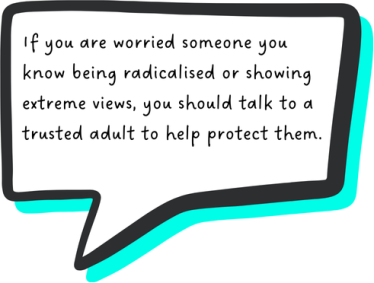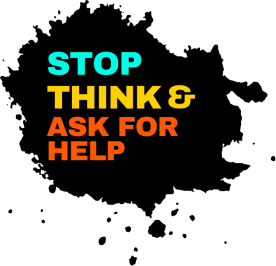When dangerous events happen such as the Christchurch terrorist attack, it can lead to people sharing disturbing and sometimes illegal content online via message or social media.
It’s normal to feel curious about where this content has come from and to want to learn more. But it’s important to be careful when looking online to avoid coming across content that is disturbing, misleading and untrue. Head to the page Fact-checking and information credibility for help with this.
What is violent extremism?
Violent extremism is when a person supports, threatens or uses violence to target a group of people in order to promote a political, ideological or religious goal.
- For more information about extremism visit the Act Early website(external link)(external link).
Why do some people have extremist views?
Radicalisation happens when a person starts to support terrorist or extremist views. There are lots of different reasons that people that might become radicalised including loneliness, grooming or connecting with other people online who have extremist views.

For more information about why some people hold extremist views visit Act Early.(external link)
What is terrorist and violent extremist content?
Terrorist and violent extremist content is material that is illegal in New Zealand because it is so disturbing that it could cause people harm if they view it. This could include:
- Websites made by terrorist or extremist organisations
- Videos or livestream perpetrator(attacker)-led footage of a terrorist attack
- Manifestos and other materials created by individuals or organisations that want to encourage violent extremism.
You can find out more information about this content at the Te Tari Taiwhenua Department of Internal Affairs(external link) website.
What should I do if I see terrorist and violent extremist content?

If you've seen something that makes you anxious or scared, ask for help from a trusted adult or call 1737.(external link) You can report also make a report to one of these organisations:
- New Zealand Police – If someone is in immediate danger or a crime is being committed call 111 immediately for help.
- The Department of Internal Affairs has a team that investigates illegal terrorist and violent extremist material online. You can make a report to them here(external link)(external link).
- The Classification Office reviews content and determine if it needs to be banned. If you come across content you think should be banned, you can contact them here(external link)(external link).
I’ve been looking at terrorist and violent extremist content and want help

Stop
In Aotearoa New Zealand it is illegal to view, download or share illegal terrorist and violent extremist material. Viewing this type of material can generate different kinds of emotions - distress, sadness, anger. It’s important to stop engaging with any unsafe behaviours and to talk to someone about it who could help you.
Think
Consider whether the content you’ve been looking at online is true or not. It’s times like these when your critical thinking skills can help you. Think about:
- Whether the content is from a safe and reputable source.
- Using websites like factcheck.org, hoax-slayer.com or snopes.com to check the content and see if it’s made up, a rumour or an urban myth.
- Whether the author is trying to push their own views or if they are being honest and factual about the topic.
Ask for help
If you are worried about the type of content you are consuming online, it is important to reach out to a trusted adult that you can be open with. This could be a parent or caregiver, a teacher, school counsellor, school community officer, social worker, your GP or sports coach.
There are also free helplines that you can use to talk to a trusted non-judgemental professional.
- You can contact Youth Line(external link) 24/7 by free texting 234, free calling 800 37 66 33 or emailing talk@youthline.co.nz
- You can contact What’s Up(external link) by free calling 0800 942 8787 or emailing whatsup@barnardos.org.nz